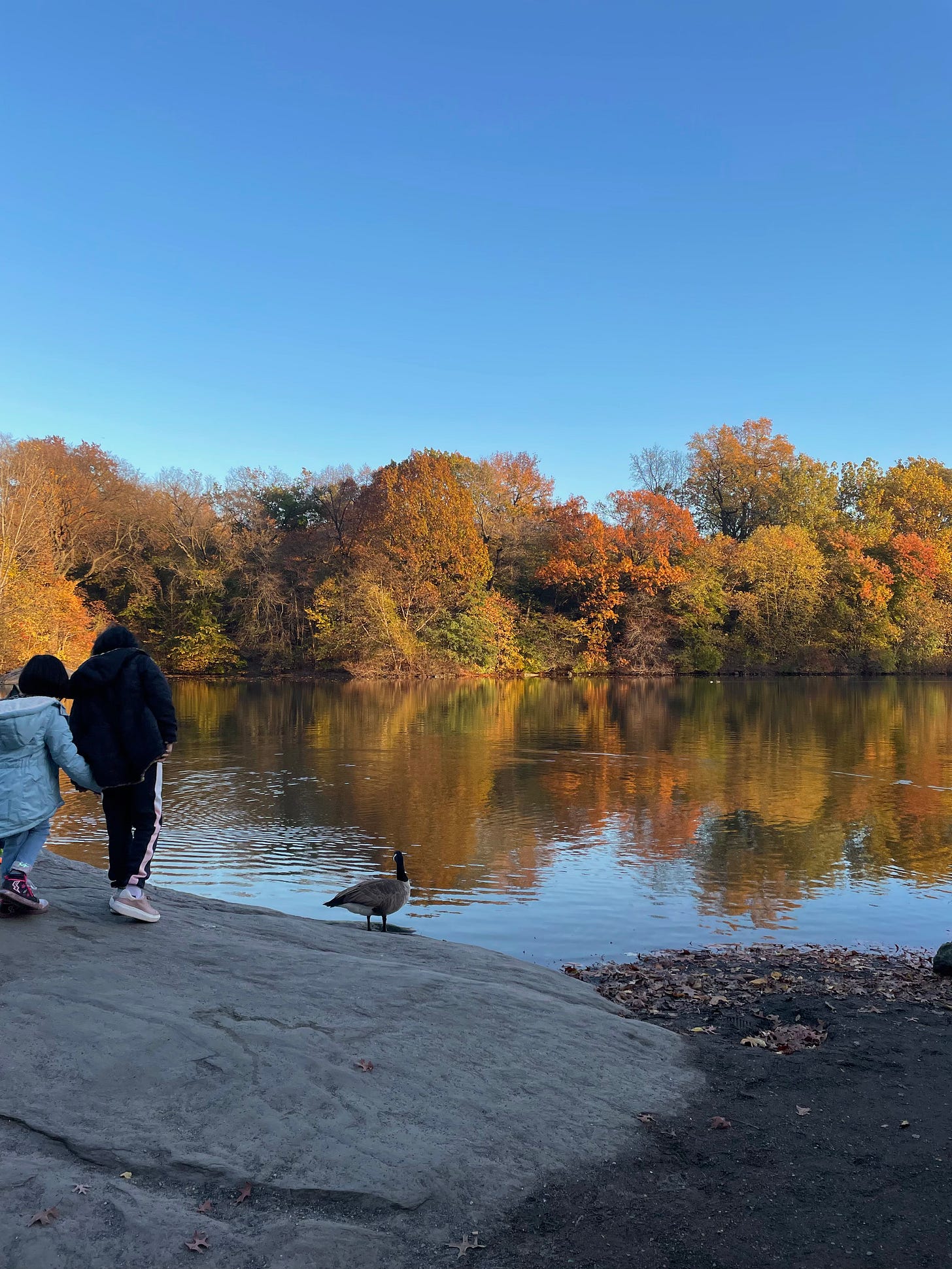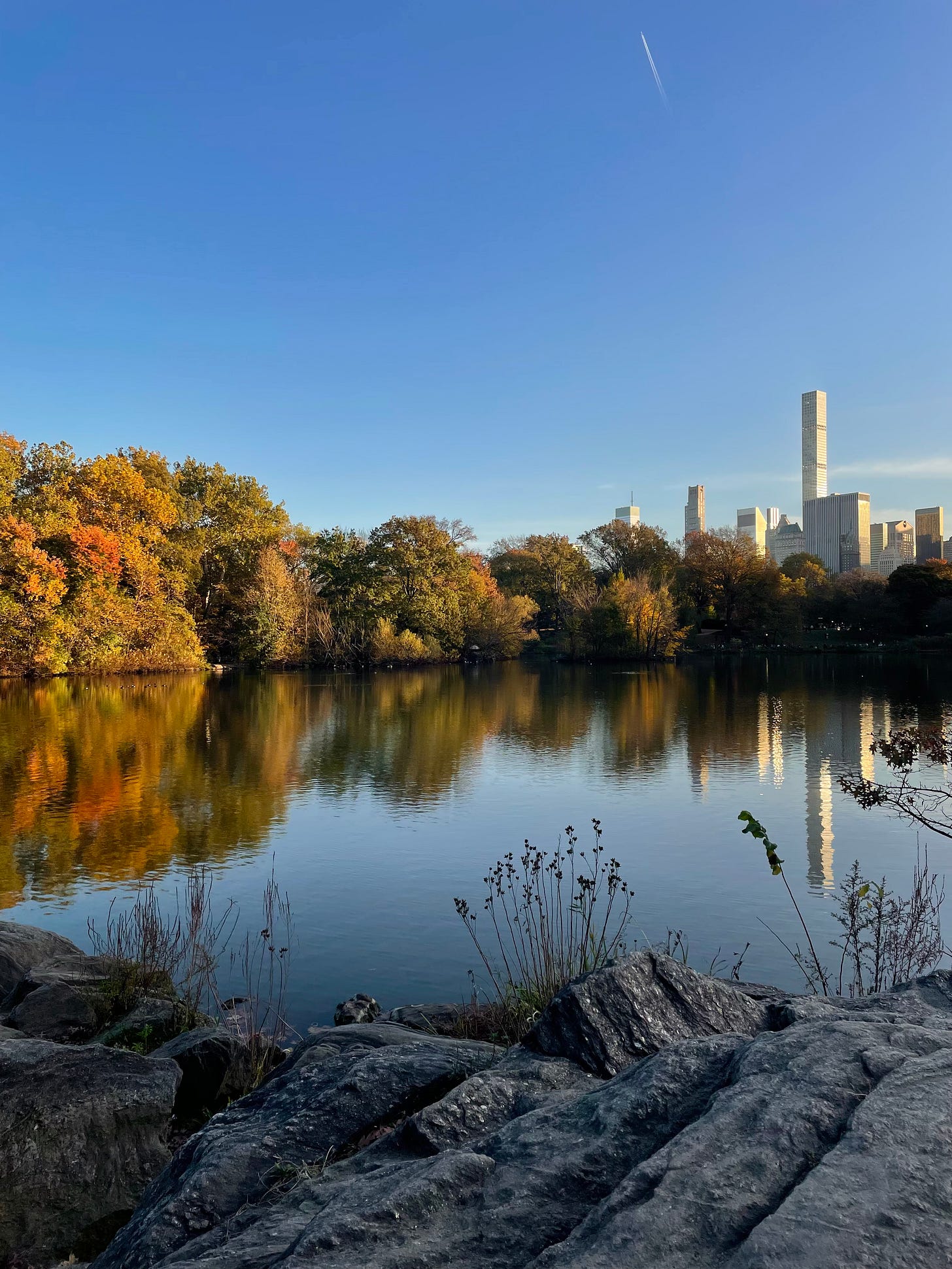The Sacred Pause
I'm wondering about burnout
Each year, there are a few words floating around the zeitgeist that get used so much that I forget what they mean. Imposter syndrome, trauma, capitalism, gaslighting, and now burnout. It gets to a point where a word gets so saturated that one needs to clarify its subjective meaning: Do you mean ‘amazing’ in the sense of “overwhelmed with sudden sense of wonder,” or… that the proposed meeting time suits you, too?
I’m all for the evolution of communication; it just gets a little murky when there is a vast range of definitions for certain words at a given time. Take my primary mental disorder, for example. I often hear sentences like “My OCD is really kicking in with the new job.”
I wonder…Does that person *also* experience such torturous intrusive thoughts that they dream of escaping their own brain…OR do they just like to color-code their files? I’m not offended; I just don’t know!
So let’s chat about this word burnout, shall we? It became a viral term following this 2019 article, which named and clarified specific challenges for a whole lot of people. That’s really valuable!
But since then, I’ve heard it used for every affliction from an influencer complaining about having to take too many photos on vacation to an ICU doctor suffering a breakdown after she couldn’t save a young covid patient’s life.
While we should never dismiss someone else’s suffering, no matter how trivial it may seem to us, there’s a usefulness in precise language that can easily get eroded in our age of pastel Instagram carousels. If burnout means a million things, does it mean anything?
This is the question I asked myself last year when I was dealing with my most severe ever case of writer’s block, plus a supreme disinterest in expressing myself creatively through any medium.
I felt uncomfortable on social media, blank when it came to book ideas, and insecure everywhere else. In my lowest moments, I felt like I’d said everything I’d ever need to say, and that none of my creative expression could have value for anyone anymore.
A counselor told me I had burnout. “You’ve been working nonstop for years, no wonder you have burnout,” she concluded.
But this didn’t feel right. I love being productive; I suspect most humans do. It’s not just societal pressures that make us want to produce, it’s also hundreds of thousands of years of evolution in favor of the people who do, create, make, get, accomplish.
It seems we’re hard-wired to simply feel a little better when we have something to show for our days. Perhaps this has been exploited by philosophies that emerged during the Industrial Revolution, but what can I say? I enjoy feeling like I’ve earned my reality show TV time at the end of an evening!
‘Burnout’ also didn’t feel accurate because…I don’t work that hard! I know I don’t work that hard because I’ve worked very hard in the past: I’ve spent years working twelve-hour days, seven days a week, to afford rent and basic life expenses at “unskilled” minimum wage jobs (which are far more difficult than any job I’ve had since). I’ve also known plenty of people who work much harder for much longer.
I believe that burnout is real; I just don’t believe that I had it.
So I kept wondering if there was a concept to describe what I had instead: discomfort, insecurity, confusion, creative block, apathy, and doubt. I didn’t think I could fully attribute it to the pandemic; many of my peers began wildly creative projects during lockdown. What was up with me?
In September of 2020, I met with my beloved tarot reader for a birthday reading. What was going on? I had no idea. I actually don’t put much stock in tarot, or astrology, or the photo that captured the color of my aura (mostly because it was unflattering). My stance is that the meaning we get from all these tools directly corresponds to the meaning we assign to them, i.e. if we’re really looking for clues, we’ll find them. I’m fine with that.
In any case, my tarot reader interpreted my set of cards as an invitation toward a…
Sacred pause, she said.
This twirled my brain around. A pause! Sacred! That sounded right!
Sometimes we need to take time off from what we’re doing, not because of burnout, but because that’s a natural rhythm of life: Bears hibernate, caterpillars decay in a cocoon, humans pause. I suspect it doesn’t have as much to do with capitalism as it does the human animal experience. Sometimes we need to take a step back. Sometimes we need to retreat.
As a freelancer, I didn’t have the option to just stop. I still had to make money. So, I kept producing, but I didn’t start anything new, nor did I put pressure on myself to figure out what was next.
At first, my new phrase gave some invigorating meaning to this retreat period. But I still had no idea how long it would last, and that made me feel itchy inside my own skin.
Sometimes I got so uncomfortable with the waiting that I would force enthusiasm about a new book idea, only to lose steam just a couple paragraphs in. Or I’d declare that my career was over, the drama of which helped me avoid the more likely possibility that I just needed to chill for a while.
It was easier for me to throw up my hands in petulant threats to quit rather than to stay in the confusion of the pause, all because I didn’t know when it would end, and the great TV remote of my life would hit “play” again.
A few Decembers ago, I was in the same sort of placeless haze where I couldn’t figure out where I belonged: which city, which job, which relationship, which community. I didn’t know what I should be searching for much less where to find it.
I whined about this to my brilliant friend Amanda, who wrote me an email the next day:
"I'm frustrated for you that you've tried so many things, and flung yourself with all your zest for life into this city you've lovingly adopted despite how it has been less than gentlemanly to you. I'm sure that in the long term you'll be able to see the value of this time and you'll see what you were being prepared for, but in the short term it's taxing on your psyche and your self-image. Advent is a reminder of the beauty of waiting and delayed gratification."
Ever the beacon of rich spiritual wisdom, Amanda referenced Advent, the lead-up toward Christmas which observers know as a time of waiting and watching.
When I think of waiting, what immediately comes to mind is the passive kind: Standing in line at the DMV in a fluorescent-lit grey office whose design is so aggressively bleak it seems intended to induce optical suffering.
But active waiting feels more like restoration and preparation, even when it’s accompanied by the discomfort of the unknown. Sort of like when you’re in a yoga class and you’re praying for a certain pose to end but the teacher just keeps reminding you to breathe and it’s almost unbearable until you realize that you’ve just gotten a whole lot stronger.
Again, I do believe burnout is a helpful concept.
But my own life’s invitation to surrender in the face of apathy would have been missed if I’d rushed to assign an ill-fitting term. I also might have overlooked the beauty of waiting, and grace in the midst of self-doubt.

Perhaps ‘burnout’ didn’t fit quite right because I didn’t feel extinguished. The pathetic little pilot light of hope stayed on, and I suppose I tended it well enough that it ignited the burner yet again.
Are you on pause, sacred or otherwise? Which button on the TV remote of life is pressed right now?



Started reading the book Radical Acceptance by Tara Brach and today’s chapter I read is chapter three called The Sacred Pause: Resting Under the Bodhi Tree !!! And then this is your writing today after I just read that !!!
Thank you again Mari 💜 The concept of burn-out has indeed eroded becoming the container concept for all stress related symptoms it now is. It also becomes of less value to use for people like me who actually suffer from it. I can’t wait to physically heal and take a sacred pause before I emerge into RL again. I always use to call the proces of pausing as “I’m marinating”, knowing that the longer you marinate the better the final version will become